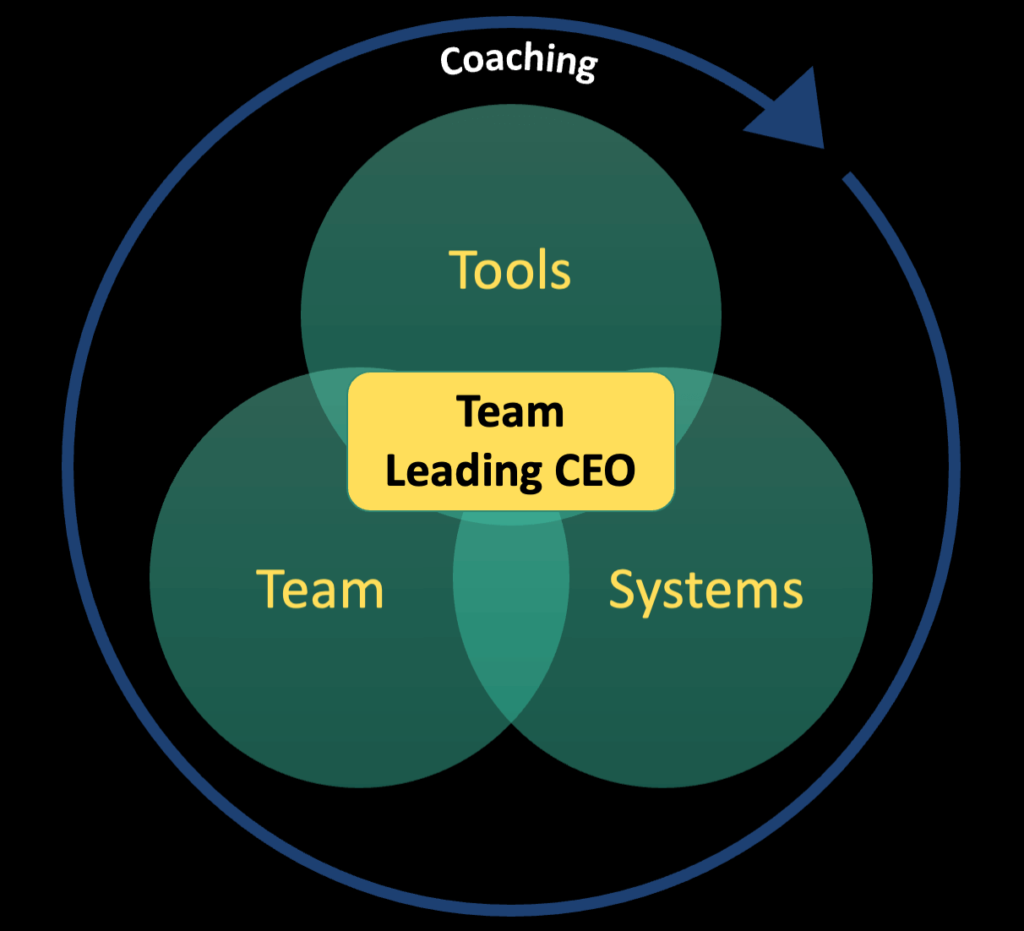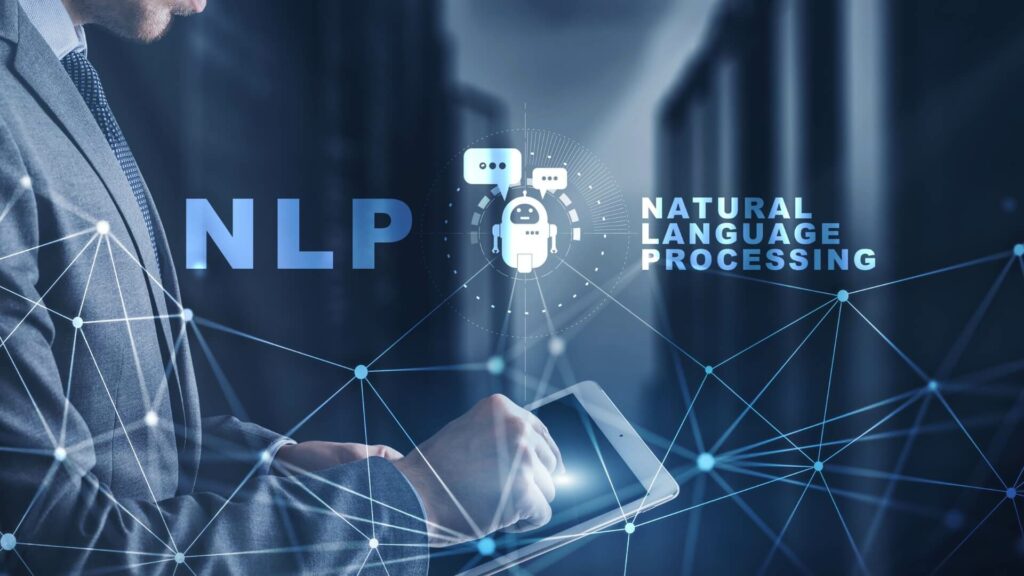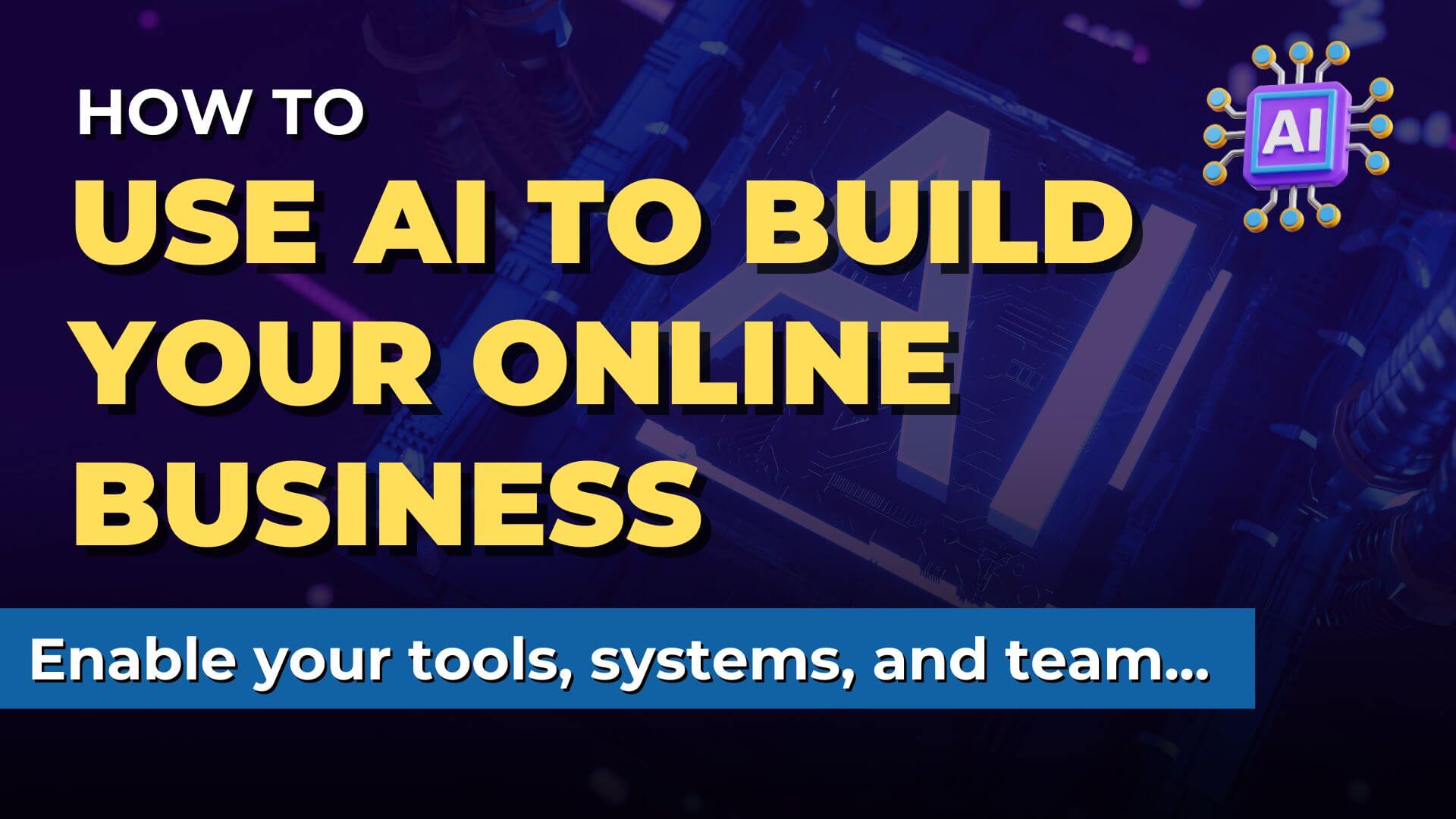How to use AI to Build Your Online Business (3 critical areas)
Learning how to use AI to build your online business has quickly become necessary for staying competitive and accelerating growth. If you don’t have a business yet, learning how to use AI to build an online business should be your first step.
By leveraging AI technology, you can publish content at scale, empower your team to be more productive, and attract more customers. In this article, you’ll learn how to AI-enable your online business and stay ahead of the curve.
Watch the Video
Analyze Your Online Business for AI Opportunities
You start by analyzing your online business and identifying the areas where AI can have the most significant impact. In our Expert Business System, we detail three pillars of a successful online business:
- Tools
- Systems
- Team

Tools are the foundational technology your business runs on, such as your website, sales funnel platform, CRM, etc.
Systems are the processes and procedures all online businesses need, such as sales, marketing, and support.
Team is the set of people, freelancers, and service providers you use to build and run your business (and yes, in the beginning, the team may consist only of you!)
Before we explore AI enabling each of those, we’ll touch on the critical aspects of AI that you need to be familiar with.
Understand the AI Fundamentals
Artificial Intelligence and Machine Learning

Artificial Intelligence (AI) is the simulation of human intelligence in machines, enabling them to perform tasks that usually require human intellect. To implement AI in your business, it’s essential to grasp basic concepts, such as Machine Learning (ML).
ML is a subset of AI that focuses on algorithms, allowing systems to learn and improve from experience without explicit programming. Your business can leverage AI solutions by feeding data into ML algorithms and enabling systems to draw insights autonomously.
Here’s a brief breakdown of ML techniques:
- Supervised learning involves training algorithms with labeled input-output pairs, which helps the model predict future outputs based on new, previously unseen inputs.
- Unsupervised learning: This technique doesn’t involve labeled data. Instead, the algorithms find patterns and structures within the input data independently.
- Reinforcement learning: Algorithms learn to make decisions based on trial and error, progressively improving performance based on a system of rewards and penalties.
Deep Learning and Natural Language Processing

Deep learning is a more advanced subset of ML that uses artificial neural networks to enable machines to process data in highly sophisticated ways. Understanding the potential of Deep Learning in your online business is crucial as it can help analyze complex data structures and detect subtle patterns that other techniques might miss.
One application of Deep Learning that can impact your online business is Natural Language Processing (NLP). NLP is a subfield of AI that enables machines to understand, interpret, and generate human language. Here are some critical NLP applications for your business:
- Sentiment Analysis: This process determines the emotional tone of textual data, such as customer reviews, to help you gauge overall customer satisfaction and identify areas for improvement.
- Chatbots: AI-powered chatbots can handle customer service tasks, answer queries, and even guide users through the purchasing process, offering a seamless and interactive user experience.
- Text Summarization: NLP algorithms can extract essential information from large volumes of text, like product descriptions or news articles, to create concise summaries easily digestible by users.
By grasping these AI fundamentals, you can better understand how to AI-enable your online business and utilize these technologies to gain a competitive edge. Always consider the capabilities and limitations of machine learning and AI technologies while implementing them in your organization.
AI Tools and Technologies for Implementation
ChatGPT
ChatGPT is an advanced AI language model created by OpenAI based on the GPT-4 architecture. It is designed to understand and generate human-like text based on the input it receives.
ChatGPT can converse, answer questions, provide recommendations, and perform other language-related tasks. It has been trained on a vast amount of text data from the internet up to a knowledge cutoff in September 2021. As a result, it can provide information and insights on a wide range of topics, but it may not be current on the latest developments or events.
ChatGPT is one of the foundational AI technologies underlying many other AI tools we’ll cover next.
AI Writing Tools
AI writing tools are software applications that utilize artificial intelligence, specifically natural language processing (NLP) and natural language generation (NLG) techniques, to assist users in creating written content. These tools can help with various writing tasks, such as generating ideas, correcting grammar and spelling, suggesting improvements in style, and even creating entire articles or pieces of content based on a given prompt or topic.
Some popular AI writing tools include:
- OpenAI’s GPT-based models (like ChatGPT): Language models capable of generating coherent and contextually relevant text based on user input or prompts, which can be used to draft content, answer questions, or engage in conversation.
- Jasper AI– Jasper is the AI Content Platform that helps you and your team break through creative blocks to create amazing, original content 10X faster.
- Grammarly: This is an AI tool that helps users improve their grammar, spelling, and style, providing real-time suggestions and corrections as they write.
- Hemingway Editor: An AI tool for editing that helps users improve the readability and conciseness of their writing by highlighting complex sentences, passive voice, and other potential issues.
These AI writing tools have become increasingly popular as they can save time, reduce writer’s block, and enhance the overall quality of written content.
However, it is essential to remember that AI-generated content may not always be perfect, and human review and editing are often necessary to ensure accuracy and quality.
AI Image and Video Tools
AI image creation tools are software applications that utilize artificial intelligence, specifically techniques like generative adversarial networks (GANs) and deep learning, to generate, modify, or enhance images. These tools can create original images, edit existing ones, or convert simple inputs into complex visuals. They have many applications, from art and design to advertising and entertainment.
Some popular AI image-creation tools include:
- DALL-E: Developed by OpenAI, DALL-E is a neural network capable of generating images from textual descriptions, allowing users to create visuals by simply describing the desired outcome in words.
- Midjourney is a generative artificial intelligence program and service created and hosted by a San Francisco-based independent research lab Midjourney, Inc. Midjourney generates images from natural language descriptions called “prompts,” similar to OpenAI’s DALL-E and Stable Diffusion.
- Synthesia is a web-based platform for creating videos with AI avatars. Thousands of companies use it to create short how-to videos in more than 120 languages, 80% faster than before
Virtual Assistants and Chatbots
Implementing AI in your business can significantly enhance customer experience, streamline operations, and establish a more efficient sales process so you can make more money online.
One way to achieve this is by using AI virtual assistants and chatbots. These AI-powered tools can handle various tasks, such as answering frequently asked questions, providing support, and even guiding customers through the purchasing process.
They can reduce response time and provide 24/7 assistance to your customers, improving their overall experience with your business. When selecting a platform, consider factors like ease of integration, customizability, and scalability.
Integrating AI into Business Processes
Streamlining Job Processes
AI can significantly improve the efficiency of your job processes in an online business. Automating repetitive tasks like data entry, email management, and document organization allows your employees to focus more on creative and strategic tasks. Consider implementing an AI system that:
- Automates routine tasks, such as organizing and labeling documents
- Monitors your workflows and recommends optimizations for enhanced productivity
- Allows for intelligent process automation, reducing human error and increasing the speed of your operations
Enhancing Customer Experience
Incorporating artificial intelligence technology and machine learning into your customer experience strategy can redefine your online business’s success. AI can assist you in various aspects of customer support and engagement, such as:
- Implementing chatbots to handle routine customer inquiries, resulting in faster response times and 24/7 availability
- Personalizing customer experiences by analyzing user data and providing tailored recommendations based on their preferences and behavior
- Utilizing AI-powered sentiment analysis to understand customer emotions and feedback allows you to make informed decisions about your products and services.
When integrating AI into your business processes, remember to prioritize continuous improvement and be open to adapting your current strategies. By leveraging AI’s capabilities, streamlining job processes, and enhancing customer experiences, you will set your online business up for greater success. Stay committed to planning and adapting your strategies as AI continues to evolve and advance.
Systemizing Your Online Business with AI
When I began to build my online business, especially when I launched the agency and we started helping clients build their expert businesses, we realized that we needed to systemize everything to be effective and efficient.
We reverse-engineered many 6, 7, and 8-figure online businesses to find out what worked and didn’t. The result was our Expert Business System, where we defined nine specific systems that every online business needs.
Those systems are:
- Project Management
- Process Management
- Sales Funnels
- Product Development
- Content
- Traffic
- Marketing
- Sales
- Support
The specifics can vary, but if you are missing any of those systems, your business cannot succeed.
With the recent advancements in artificial intelligence with ChatGPT, machine learning, and large language models (LLM), every one of those systems can be improved or accelerated.
For example, across each of them, you can look for repetitive tasks, data-driven decision-making, and customer-facing interactions – these are prime candidates for AI implementation.
Remember that the key to success is prioritizing high-value strategic initiatives and utilizing AI to support and enhance your existing processes.
The challenge nearly all solopreneurs and online entrepreneurs have in their first few years is not enough time or people to get all of those in place and working together.
The artificial intelligence revolution can dramatically change the game for you. Think of AI as a new team member you can add to your business’s critical systems.
As you move ahead, consider creating a project in your business to assess and AI enable every system and process.
Let’s take a look at how to leverage artificial intelligence with each one.
Project Management and AI
Incorporating AI into your project management system can significantly improve efficiency and decision-making. AI can help you analyze project data, predict potential bottlenecks, and optimize resource allocation.
AI can also assist in task prioritization, ensuring that your teams focus on high-value tasks that align with your business goals. Integrating AI into your project management processes can lead to a more streamlined and effective approach to managing your online business.
Artificial intelligence is rapidly being built into most project management tools. For example, in my team, we use Notion, and it has added several AI features, with more on the way.
Process Management and AI
Systemizing your process management with AI can help automate mundane tasks, allowing your team to concentrate on core competencies. The process management tools we use, such as Scribe for automatically documenting processes, along with Process Street for documenting and managing the execution of them, have also been AI-enabled.
Artificial intelligence can also identify opportunities for process improvement by analyzing patterns in your data and suggesting ways to optimize your workflows. By implementing AI-enabled process management tools, you’ll be able to create more efficient and well-structured procedures for handling day-to-day operations.
Sales Funnels and AI
Implementing AI in your sales funnels can have a significant impact on customer experiences and conversion rates. AI can help you personalize content based on customer behavior, creating highly targeted marketing campaigns. Additionally, AI can help analyze and optimize your sales funnels by identifying bottlenecks and suggesting improvements to increase conversions.
In our Accelerate platform powered by GoHighLevel, we have also added additional AI chatbots, content writing, and other features to make the process of designing and building funnels for our clients much more streamlined.
Products and AI
AI technologies can be a valuable resource in developing innovative products and services for your online business.
You can use ChatGPT, Jasper, and other AI writing tools to plan and build products such as courses, membership sites, and coaching programs. From the initial outline into modules and the last 20% to perfect it.
Machine learning algorithms can analyze vast amounts of customer data, uncovering insights that enable you to create tailored offerings, ultimately enhancing customer satisfaction and loyalty. Integrating AI into your product development processes can help ensure that your products continually evolve to meet the changing needs of your target audience.
Content and AI
Leveraging AI in your content creation process can save you time and resources while ensuring your content remains relevant and engaging. AI enables my business and our clients to begin publishing content at a scale previously reserved only for influencers like Gary V or Russel Brunson with huge teams.
Now, similar output and quality can be produced by online entrepreneurs using fractional teams.
AI-powered content tools can analyze audience behaviors and preferences to help you create content that resonates with your target audience. Additionally, AI can aid in optimizing your content distribution strategies by identifying high-performing channels and optimal posting times.
Traffic and AI
AI can be instrumental in driving targeted traffic to your online business. Machine learning algorithms can analyze user behavior and patterns to determine which marketing channels will most likely bring high-quality leads. Multiple tools are emerging to analyze effective ads, help you quickly create ads and ad campaigns, and then manage them.
By implementing AI-driven traffic generation strategies, you’ll be able to attract visitors who are more likely to engage with your content and convert it into customers.
Marketing and AI
Incorporating artificial intelligence into your marketing efforts can help you create more effective data-driven campaigns. AI can analyze customer data and segment your audience, allowing you to create highly targeted messages that resonate with each customer segment.
Moreover, AI can optimize your marketing budgets by enhancing ad placements and bidding strategies, ensuring you get the most out of your advertising spend.
Sales and AI
AI can transform your sales processes through intelligent lead scoring, prediction of customer behavior, and automated follow-up.
ChatBots are becoming AI-enabled and replacing some entry-level work like finding meeting times that work for people, following up with them, asking and answering basic questions, and so on.
Instead of you or your setter(s), if you have them wasting time on those, AI can handle them and then turn your prospect over to you once the basics are completed.
AI can empower you and your team to focus on high-potential leads and nurture them effectively. Additionally, AI can automate certain aspects of the sales process, reducing manual effort and enabling your team to concentrate on building customer relationships.
Support and AI
Customer support is crucial for retaining customers and maintaining a positive brand image. Integrating AI into your support processes can help you deliver more efficient and personalized customer service.
Chatbots, for instance, can handle routine queries, while AI algorithms can analyze customer interactions to identify patterns and areas for improvement. By leveraging AI in your support system, you can provide better, faster service that keeps your customers returning.
Increasing Your Team’s Productivity with AI
This section will explore some personal productivity improvements you and your team can achieve by leveraging AI tools.
Think Of AI Tools As A Personal Assistant
Like a personal assistant, AI tools can help you manage your tasks, schedule appointments, and provide valuable insights and recommendations. For example, you can use AI-powered email filters to prioritize your inbox and automatically categorize your emails based on their importance. This can save you time and help you stay on top of your email communications.
Another way to use AI as your assistant is to leverage virtual assistants like ChatGPT, Jasper, and others. These assistants can help you with various tasks, from answering customer questions to scheduling meetings and providing personalized recommendations. Using a virtual assistant, you can free up your time and focus on more strategic tasks requiring your attention.
By also providing AI assistants to any team members you have, you will also help them raise their overall productivity levels.
AI Tools To Provide Everyone On Your Team
At this point, it probably goes without saying that providing ChatGPT and paying for ChatGPT Plus for yourself and your team members is more than worth it.
Beyond that, several others can be worth the investment, such as Jasper (which utilizes Chat GPT but streamlines many use cases with templates). One key advantage is creating a brand voice and using it across your team. This is what Jasper defines a brand voice as:
A brand voice is the unique personality and style of communication that a brand uses to connect with its audience. It encompasses the tone, style, and language used in all forms of brand communication, including marketing materials, social media posts, and customer service interactions. Jasper Brand Voice is a powerful tool designed to streamline your content creation workflow and increase productivity. Specifically, Jasper Brand Voice helps Jasper sound like you and generate factual and accurate content.
If content creation and publishing are important to your online business, then there are additional tools that can help you establish what we can a Content Engine.
One of our favorite team tools for AI content is Descript. It is a great solution for editing, captioning, and re-purposing across the team.
For all our SEO and AI writing needs, we’ve also recently started using SurgeGraph. It combines several usually expensive capabilities like keyword research (can replace Ahrefs), on-page SEO (can replace Surfer SEO), and long-form AI writing (can replace Jasper, at least for long-form content)
ChatGPT and most AI writing tools are very good at short or medium-length content but not very good at long-form content like authoritative blog posts you want to rank for.
SurgeGraph’s Longform AI doesn’t solely on GPT techniques — you might as well use ChatGPT for that. Instead, Longform AI uses SurgeGraph’s own NLP algorithm combining the powerful GPT models and 50+ SERP data points. This algorithm gives Longform AI the ability to produce top-notch, SEO-optimized content.
Longform AI is designed to write engaging and original content that reads like a human wrote it. Using advanced NLP techniques, Longform AI imitates the tone, sentence structures, and character of human writing.
What I like about SurgeGraph is that while you can just enter a keyword and have it write 3,000 – 4,000 word posts for you, it also lets you build your detailed outline of the structure and topics you want to cover, points you want to make, questions you want to answer, etc. Then the AI helps you add to the outline and write the entire post.
Automating repetitive tasks
AI can also help you automate repetitive and time-consuming tasks like data entry, report generation, and content creation.
By using AI-powered tools and services, you and your team members can automate these tasks and free up time for more creative and strategic work.
Some of the automation platforms you’re probably already using are also gaining AI capabilities. Zapier is a great example as it can already integrate ChatGPT, thus letting you connect the thousands of other apps Zapier already integrates with to ChatGPT.
One of the ways we’re using this is to re-purpose content. So, for example, once we use the processes above to create a long-form blog post, we drop that into a folder that triggers a Zap to take the full text and send it to ChatGPT to turn it into a script for a podcast and also a YouTube video.
Then for each of those, it goes to a second step to create summaries of each for social media posts and show notes. Then a further step pulls quotes out. Then we’re working on importing them into Canva to automatically make image quotes and other posts. The initial content triggers all.
Personalized recommendations and insights
Finally, AI can provide valuable insights and recommendations to help you make better business decisions. For example, you can use AI-powered analytics tools to analyze your website traffic and customer behavior. This can help you identify patterns and trends that you can use to optimize your marketing and sales strategies.
Responsible AI Deployment
Ethical Considerations and Privacy
When deploying AI in your online business, it’s crucial to consider the ethical implications and data privacy aspects. You should aim for your AI systems to be accountable and impartial, with open algorithms and an unbiased approach (Forbes). Design and implement clear policies for data handling, user consent, and transparency.
To ensure privacy, consider the following:
- Use anonymization techniques to protect user data.
- Set up clear data retention policies.
- Continuously monitor and assess AI models to ensure they comply with ethical values and privacy regulations.
- Run all AI-generated content through plagiarism detection tools.
Cybersecurity and Risk Management
When implementing AI in your online business, being vigilant about cybersecurity and managing risks is critical (PwC). AI systems can introduce new vulnerabilities, and security measures should be integrated into the development and deployment phases.
Follow these guidelines for enhanced cybersecurity and risk management:
- Assess potential vulnerabilities and threats introduced by AI.
- Implement appropriate security controls and practices, such as encryption, access controls, and regular security audits.
- Monitor AI systems for signs of potential security incidents or breaches.
- Develop incident response and recovery plans for AI-related cybersecurity events.
Remember that achieving responsible AI deployment requires continuous effort and monitoring. Addressing ethical, privacy, and cybersecurity issues will create a more secure and trustworthy AI-enabled online business.
Monitoring and Improving AI Performance
Tracking Business Value and Outcomes
As a small or medium-sized online business owner, keeping an eye on the business value generated by your AI systems is crucial. Begin by establishing clear performance metrics that correlate with your business goals. Monitoring these metrics regularly will give you a better understanding of how AI impacts your organization.
For example, if your goal is to improve customer satisfaction through AI-powered chatbots, your key performance indicators (KPIs) might include the percentage of customer inquiries resolved, customer satisfaction scores, and average response times. Implement a system to track these KPIs, allowing you to adjust your AI algorithms or data inputs accordingly.
Consider presenting your findings in a concise and visually appealing format, like using tables or charts, to easily understand and communicate the results to stakeholders.
Staying Updated on AI Evolution
AI technology is rapidly evolving, and as a small or medium-sized online business, it’s important to stay up-to-date with the latest advancements in algorithms and methodologies. Boost your expertise by subscribing to industry newsletters, attending conferences or webinars, and consistently networking with other professionals in the AI and technology space.
In addition to enhancing your understanding, invest in regular training for your team members so they can adapt to changes in the AI landscape as well. Continuously evolving your AI strategies will keep your organization competitive and help you maximize the business value of your AI investments.
Remember, by keeping a close eye on the business value and the evolution of AI technology, you can make the most of AI for your online business. So stay focused on tracking outcomes, improving algorithms when necessary, and moving forward confidently in the ever-changing world of AI.
How to use AI to Build Your Online Business
Building Internal Expertise
To effectively scale AI in your online business, investing in building your employees’ internal expertise is crucial. Educating your team on AI tools, technologies, and their application to your business operations is very important.
- Offer training programs to your employees, focusing on using AI in their specific roles.
- Encourage your team to attend webinars, workshops, and conferences to stay up-to-date with AI trends.
- Build a culture of experimentation and continuous learning.
Collaborating with AI Service Providers
To implement AI more efficiently, consider collaborating with AI service providers. These experts can help you develop solutions tailored to your business needs and enable you to focus on your core operations.
- Explore different AI tools and platforms available in the market.
- Reach out to freelancers or specialized AI service providers that can help you create customized AI applications.
- Create partnerships between your AI service providers and internal team members for smoother integration and collaboration.
In summary, it’s important to invest in the development of your AI infrastructure and internal expertise. By empowering your employees with AI tools, your small or medium-sized online business can achieve significant growth, and collaborating with AI service providers can help accelerate your AI implementations.
Future Trends and Opportunities
As you look forward to leveraging AI in your online business, consider the following trends and opportunities currently shaping the AI landscape.
- Increasing investments in AI: With the growing importance of AI in various industries, more funding is being directed toward AI research and development. You can benefit from this trend by staying updated on the latest AI innovations and incorporating relevant AI technologies into your online business.
- Automation of routine tasks: AI enables businesses to automate their routine operations, freeing the workforce for more critical tasks. For example, integrating AI with tools like Excel can help you streamline processes and improve efficiency.
- Improved customer support: AI-powered chatbots can revolutionize your customer support department, providing instant responses to customer inquiries and reducing the workload of support staff. This automation can extend to other aspects of your business, integrating with tools like Outlook to manage communications more effectively.
- Deep learning algorithms: Utilizing deep learning algorithms allows your business to tap into insights from large datasets, identifying patterns to optimize marketing strategies or inform product development. For example, leveraging AI for customer targeting can lead to better sales.
In summary, you should stay informed about the latest AI trends, explore opportunities to automate routine tasks, and strategically invest in AI technologies for your online business.

David Ziembicki
David Ziembicki is the founder and CEO of the Expert Business Agency, which helps coaches, course, and membership creators build their online businesses. David has been an industry-leading technology and business consultant for over 25 years having worked at Microsoft, Deloitte, SAIC, and Avanade.

